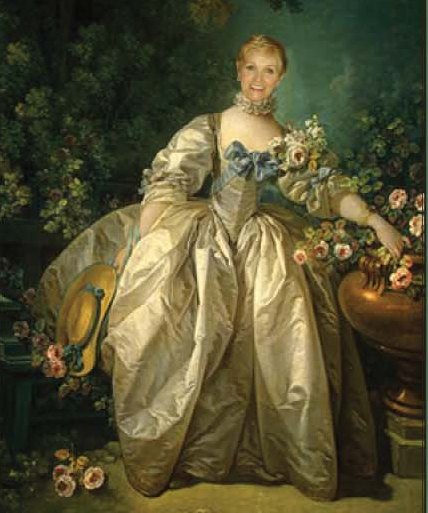Nancy, daughter of Capt. Joseph I. Henderson, Sr. and Adelphia Lea (daughter of James Lea and Anne ?) was born either in Virginia or North Carolina about 1758. She married Lawrence Bankston about 1777 in North Carolina. Joseph Henderson, James Lea and Lawrence Bankston served as Patriots in the Revolutionary War. About 1785, Nancy and Lawrence Bankston moved from North Carolina to Wilkes County, Georgia where they settled near the banks of Kettle Creek. Her Henderson grandparents lived close by on Clark Creek. Her parents were charter members of Sardis Baptist Church near Centerville, now Rayle, in Wilkes County. Nancy became a member of that congregation as well as her daughters, Isabella and Sallie. Lawrence Bankston died in 1844. Nancy died on 26 September 1849 and was buried next to her father and mother.
Miriam, Ibby, and Mary Ann Brooks are seated on the left side of the four poster bed;
The Greer girls, daughters of Nancy Hester and Jesse Greer are at the foot of the bed, wrapped up in the big coverlet. Isabella and Isaiah Irvin's granddaughters are about the same age - rejoicing in the camaraderie of visiting cousins. Two Mozley granddaughters pull back the heavy floral side curtains at the foot of the bed to chime in with their cousins clamoring for more stories.
"What more can I tell you? Let's see. I have already told you about your
"Now that I am so old, I am so very forgetful. Let's see. I have told you the stories of moving to this country of
“If only my eyesight wasn’t failing and I could write down some of the stories for you to tell your granddaughters one day. Why, if I had written a book with my stories, I would have titled it, “Stories of our Grandmother’s Spirit.” But now my memory fades. Who will tell the stories when I am gone? Do you know, girls, what this means?"
"The first thing is the most important of all. Remember what I tell you now. No matter what happens to you in life, you can choose to place your trust in a loving God. That is the most important thing. Always look beyond the day's troubles having faith that tomorrow will be a better day because God loves you beyond your wildest imagination. That is the first and most important thing."
"The second thing is the most important of all. It is by far the most important. And that is to listen to your heart, as well as your mind, as you make life decisions. Sometimes your journey will call you to venture into uncharted waters or on paths that are not brightly lit. You may face strong opposition from friend and foe alike. Listen to them, but trust your own inner spirit to guide you, always mindful of strangers in need of soul care along the way. And that is the second important thing to remember. It is the second and most important of all."
"The third thing is the most important of all. It is without doubt the most important to remember. If first - you have faith and trust in God, and second – if you are willing to travel unknown paths prepared to care for souls you encounter with a warm smile and gentleness – then surely the third and most important thing is to be prepared for the journey by sharpening the scissors of your minds with a good education. And this is surely the most important of all."
"But, Grandmama," the girls echoed, "how can three things be equally the most important?"
